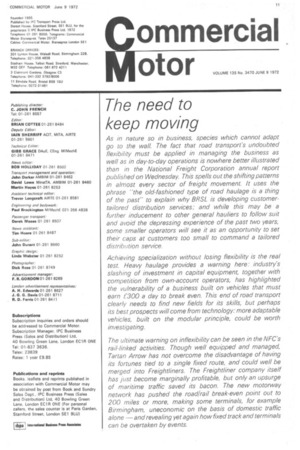The need to keep moving
Page 13

If you've noticed an error in this article please click here to report it so we can fix it.
As in nature so in business, species which cannot adapt go to the wall. The fact that road transport's undoubted flexibility must be applied in managing the business as well as in day-to-day operations is nowhere better illustrated than in the National Freight Corporation annual report published on Wednesday. This spells out the shifting patterns in almost every sector of freight movement. It uses the phrase "the old-fashioned type of road haulage is a thing of the pastto explain why BRSL is developing customertailored distribution services,. and while this may be a further inducement to other general hauliers to follow suit and avoid the depressing experience of the past two years, some smaller operators will see it as an opportunity to set their caps at customers too small to command a tailored distraition service.
Achieving specialization without losing flexibility is the real test. Heavy haulage provides a warning here.. industry's slashing of investment in capital equipment, together with competition from own-account operators, has highlighted the vulnerability of a business built on vehicles that must earn £300 a day to break even. This end of road transport clearly needs to find new fields for its skills, but perhaps its best prospects will come from technology: more adaptable vehicles, built on the modular principle, could be worth investigating.
The ultimate warning on inflexibility can be seen in the NFC's rail-linked activities. Though well equipped and managed, Tartan Arrow has not overcome the disadvantage of having its fortunes tied to a single fixed route, and could well be merged into Freightliners. The Freightliner company itself has just become marginally profitable, but only an upsurge of maritime traffic saved its bacon. The new .motorway network has pushed the road/rail break-even point out to 200 miles or more, making some terminals, for example Birmingham, uneconomic on the basis of domestic traffic
alone and revealing yet again how fixed track and terminals can be overtaken by events.




































































































